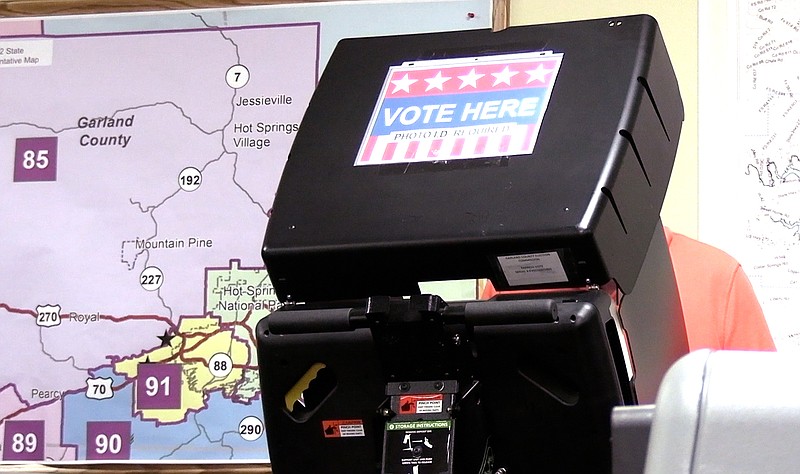Garland County voters can expect long lines and the possibility of getting the wrong ballot if hand-counted ballots replace bar code voting machines, the county's election chief said last week.
Election Coordinator/Chairman of the Garland County Election Commission Gene Haley was responding to Arkansas Voter Integrity Initiative Inc. claims that the bar code system the county has used since 2016 is subject to fraud and manipulation. Several people parroting those claims questioned him at the presentation he gave last week at The Mahoney Building.
County Judge Darryl Mahoney said turnout for Wednesday's meeting was less than expected, given the number of calls and concerns the county received.
"We've had an enormous number of phone calls and inquiries about it, and I really expected for the room to be full," he said. "We expected 100 people. We feel like we have as streamlined and secure of a process in our elections that you can possibly have. I don't think there's a better election coordinator than Gene Haley."
Touch screens voters use to make their selections are ballot marking devices. They produce ballot cards bearing the names of the candidates the voter selected and a bar code. Voters put the ballot into DS200 scanners that read the bar code and count the votes.
Garland was one of the first counties to receive the machines as part of a $2.5 million pilot program the secretary of state funded in 2015. The county has used them in every election since the March 2016 preferential primaries and nonpartisan general election. Haley said the machines are key to the county's goal of an "error-free" election.
The Arkansas Voter Integrity Initiative has been leading the call for hand-counted ballots. Under the state election code, quorum courts decide if a county will hand count votes or tabulate them electronically.
A new law requires paper ballots to be run through a tabulation device before they are counted by hand. It also makes counties that choose paper ballots responsible for the cost of the ballots and machines used to print and tabulate them. Proponents of hand-counted ballots have said the new requirements encourage counties to maintain bar code voting.
The ballot activation card voters receive after checking in at a vote center contains a bar code with the voter's precinct. The bar code tells the ballot marking device which slate of races to bring up on the touch screen. The system is key to the vote center model the county adopted in 2015 that allows voters to choose where they cast their ballot on election day.
Haley said assigned polling places would have to be reinstituted if the bar codes weren't used, as the chances of voters getting the wrong ballot would increase significantly. Haley said vote centers would need thousands of each ballot style.
"We had 67 ballot styles in the last election," he said. "That means we would need 67 stacks of ballots at each location. The chances of someone getting the wrong ballot by mistake are tremendous."
Assigning voters to polling sites based on voting precincts would limit the number of ballot styles at each location but be less convenient for voters, particularly those assigned to busy polling places. Haley said hand-counted ballots would also be more expensive for the county, requiring more poll workers and more than twice the 16 election-day voting locations the county has used in recent elections.
Haley said hand-counted ballots often require poll workers to interpret voter intent if the voter hasn't marked the ballot clearly. Counting by hand is also time-consuming and increases the likelihood of tabulation errors, he said.
Several people asked if the touch screens have networking capabilities that allow them to access the internet.
"Let me say it again: These machines are not connected to the internet," he said, noting that state law prohibits it.
He said the encrypted file containing the county's unofficial election results that's uploaded to the secretary of state's office on election night is the only time the results are transmitted electronically. Ballot cards are kept for two years as a paper backup.
Per state law, voting machines are tested for accuracy prior to every election. Haley said people are welcome to attend the county's testing, but few do.
